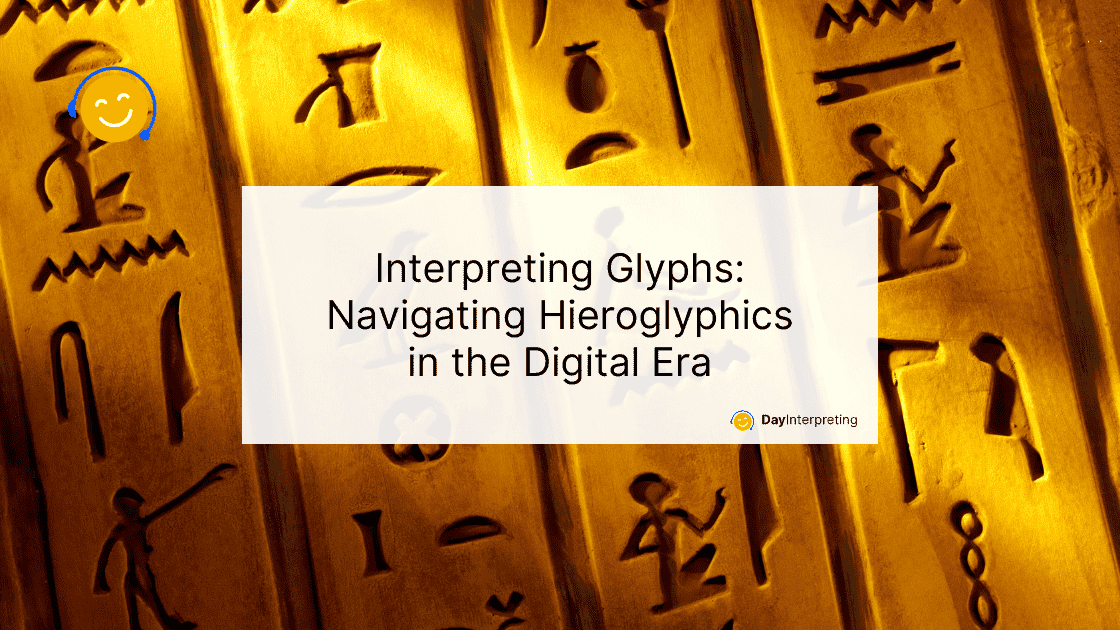Greetings, language aficionados, and welcome to a special feature on the intersection of language and technology! In this blog post, we’re diving into the captivating world of hieroglyphics, exploring the unique challenges and innovative solutions that arise when bridging the gap between ancient scripts and the digital age within the context of interpreting services. Ready to learn more about interpreting glyphs? Strap in!
Unraveling Ancient Mysteries
Picture yourself standing amidst the remnants of an ancient Egyptian temple, surrounded by the mysterious allure of hieroglyphics adorning its walls. These symbolic messages, once integral to communication in a bygone era, present a captivating puzzle for interpreters seeking to make them accessible in our modern digital landscape.
Decoding the Digital Dilemma
While the digital age has revolutionized the way we engage with language, deciphering hieroglyphics isn’t as straightforward as a click of a button. These intricate symbols pose a unique challenge that demands specialized attention, especially in the realm of interpretation.
Challenges in Interpreting Glyphs
Interpreters grapple with several hurdles when dealing with hieroglyphics. The intricate nature of the script, the necessity for cultural accuracy, and the potential loss of subtleties during interpretation are just a few of the obstacles that call for creative solutions.
1. Hieroglyphic Complexity
Hieroglyphics, with their blend of logograms and phonetic signs, present a linguistic maze. Interpreters must skillfully navigate the delicate balance between symbols representing concepts and those conveying sounds to ensure the essence of the message remains intact.
2. Cultural Sensitivity
Bringing an ancient message into the present requires a deep understanding of the cultural context. Interpreters become cultural ambassadors, delving into the world of ancient Egypt to capture the nuanced meanings that could be lost in a less meticulous interpretation.
3. Preserving the Past
Preserving the richness of hieroglyphic texts demands a harmonious blend of technology and human expertise. Advanced algorithms, artificial intelligence, and linguistic proficiency come together to ensure that nothing is lost in interpretation.
Technological Allies in Interpreting Glyphs
Let’s explore the technological marvels that aid in the interpretation and preservation of hieroglyphics:
1. Machine Learning Marvels
Sophisticated algorithms learn the intricate patterns of hieroglyphics, automating the interpretation process. Machine learning models, complemented by human oversight, guarantee accuracy and context-aware interpretations.
2. Virtual Interpretation Journeys
Digital reconstructions allow interpreters to virtually traverse through ancient temples, deciphering inscriptions in their original settings. Virtual and augmented reality applications offer an immersive experience, enhancing the interpreter’s understanding.
3. Collaboration in the Cloud
Interpreters and historians collaborate seamlessly across the digital realm. Cloud-based platforms facilitate real-time collaboration, ensuring that the interpretation process benefits from a diverse range of perspectives.
Breathing Life into Hieroglyphics
In conclusion, our exploration of hieroglyphics in the digital age reveals a landscape where technology and linguistic finesse intertwine seamlessly. Interpreters, armed with cutting-edge tools, bring these ancient symbols to life for a modern audience, ensuring that the stories encoded in hieroglyphics resonate across time.
As we conclude this blog post, remember that every hieroglyphic carries a narrative. Through the right blend of technology and expertise, interpreters can unlock the secrets of the past for contemporary audiences. Stay curious, language explorers!





0 Comments